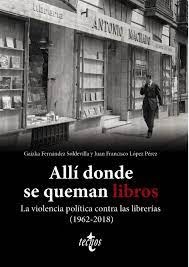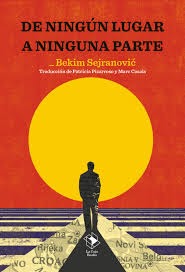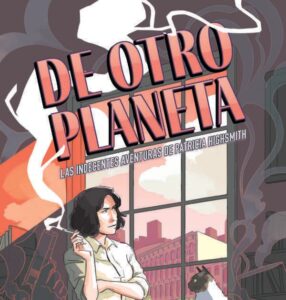
Original language: castellano
Year of publication: 2023
Valuation: Between Recommended and Okay
It is assumed that if we meet here, on this blog, it is because we like books, so I guess I’m not wrong. And for those of us who have this hobby, books are something important, a hobby, yes, but also a way to enjoy a certain beauty, to access the thoughts and talents of others, an excuse to share opinions, to stop and reflect on things. which perhaps we had not thought about. There are a thousand reasons to, if I may be so corny, love books. And for this group that we form, I don’t know if big or small, bookstores are therefore small temples of culture, the closest ones, the ones we found (or found) at street level.
On the most prosaic level, the bookstore is obviously also a business, the way of life of its owners, an activity subject like any other to the whims of the market. Right now, without going any further, under the shadow of digital looming, without us being sure that it will not end up completely eliminating the old toche of printed paper.
But in complicated circumstances, where dictatorships reign or fanaticism proliferates, the bookstore is a center of dissidence, of resistance to dictates and impositions. In the words of the poet Joan Margarit, ‘freedom is a bookstore’. And the book, a dangerous object that must be hidden in back rooms and passed from hand to hand with caution. Fascists of all stripes do not like books, because the book is the maximum expression of freedom of thought and expression, and that is precisely what they cannot stand.
In the last decade of the Franco regime, some outposts of freedom crept into bookstores, thanks to a certain expertise acquired over the years, some small relaxation of the government’s gag, and the pressure of a society that was beginning to overwhelm the seams of an intellectually dwarf system. In a more or less hidden way, banned titles begin to circulate and bookstores, many of them, go from being simple commercial establishments to assuming the role of centers of cultural dissemination and opposition to Francoism. At the same time, an involutionist movement begins to emerge, agitated by individuals like Blas Piñar or Girón, who see the ‘conquests’ of the most rancid Francoism in danger, even more so when the proximity of what was so amusingly called the ‘biological fact’ begins to appear. ‘, that is, that nature would end up doing what the Spanish had not achieved.
The most brainless puppies of that sector launched themselves into what they considered a new ‘crusade’, and what better target than the bookstores, those that had been most perceived as rebels or protestors, peaceful establishments with accessible shop windows that could be defaced or destroyed, with many books (that mysterious thing that surely has something bad inside) that are easily burnable. A rumor, the suspicious colors of a cover or a title that seems to deviate from the canon is enough to launch the stone or the Molotov cocktail.
Ultra harassment languishes when the aggressors see their battle lost, and in Euskadi the leading role is then taken by the Street fight (urban guerrilla, being very generous). The motivations are somewhat different, here it is above all about crushing those who do not bow to the demands of these other fanatics, those who stand for political options other than their own, refuse to lower their blinds when ordered or They remain in the hostile territory from which they want to expel them. With no more support than that of a few friends and neighbors, with the majority looking the other way and terrorist actions threatening or directly liquidating people in the area, the Minicost bookstores in Andoain, and Lagun in Donostia-San Sebastián, barely survived. The latter heroically withstood the multiple attacks until its owner retired on August 31.
In these cases the bookseller was not the object of attack for what he exhibited or sold but for his dissidence, for maintaining his freedom of thought and expression in the face of fascist intimidation. But always at street level, standing up and defending his livelihood, but also the culture and a few basic principles that some were not willing to give up.
Well, now, the book. Well, the book tells us all this in great detail, a thousand pieces of information, testimonies, information about the scenario and the political evolution of the different groups of book burners and their instigators. A very serious, conscientious work, profusely annotated and with extensive bibliography, something that sounds more like a researcher’s thesis, but which I fear may not resonate with the reader, at least that is what happened to me. Perhaps by limiting itself to such a narrow geographical and temporal scope (Spain, from 1962 to the present) there is not really much material to tell, and it is necessary to go into too many details.
We then lose a broader perspective, because books have been burned in many places and moments in history and, in the words of Heine, “where books are burned, human beings end up being burned as well,” Yes, yes, although the poet did not see how well his Hitler compatriots fulfilled the axiom. Each of these episodes is a wake-up call, also a small tragedy, a step backwards for culture and civilization, but equally a sign of the desperation of the fanatics, incapable of exhibiting anything other than their own bestiality.
This time we care less if the book we bring is more or less fortunate, because the fundamental thing is that it has served as an excuse to pay this small tribute to bookstores and booksellers, an increasingly scarce commodity.
Also by Gaizka Fernández Soldevilla in ULAD: Heroes, heterodox and traitors
Source: https://unlibroaldia.blogspot.com/2023/11/dia-de-las-librerias-gaizka-fernandez.html


